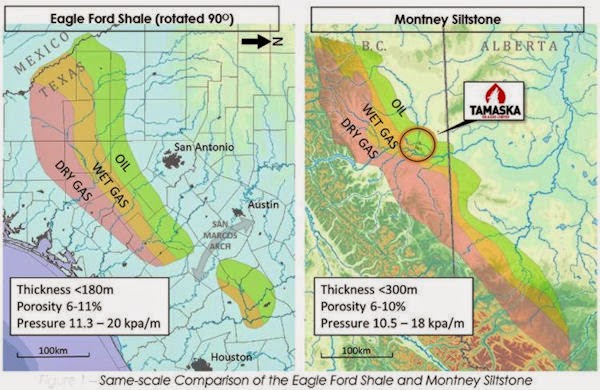Canada’s Shale Boom: More To Come In Montney
 by James Burgess: In the world of a constantly changing oil and gas environment, the Montney shale basin is the sleeping giant that holds the key to accelerating Canada’s shale oil and gas boom, but the real treasure within this giant is a tight liquids-rich zone (approximately 15-20 miles wide) that has big and small players alike narrowing their focus for the potential of a giant payout.
by James Burgess: In the world of a constantly changing oil and gas environment, the Montney shale basin is the sleeping giant that holds the key to accelerating Canada’s shale oil and gas boom, but the real treasure within this giant is a tight liquids-rich zone (approximately 15-20 miles wide) that has big and small players alike narrowing their focus for the potential of a giant payout. A pervasive hydrocarbon system in the Western Canada Sedimentary Basin (WCSB) in Alberta and British Columbia, the Montney is estimated to hold 2,200 trillion cubic feet of gas, almost 29 billion barrels of natural gas liquids and over 136 billion barrels of oil. But it is the tight liquids rich fairway (approximately 15-20 miles wide) that contains high concentrations of both free condensate and natural gas liquids that everyone is pursuing in what may very soon be one of the largest commercially viable plays in the world.
Investors aren’t exactly shying away from the challenge, and the overall trend within this large basin is a shift towards liquids-rich areas, which is what the Middle Montney (the middle portion of the Montney resource) is all about.
Initially, companies targeted the Upper Montney, and the entire formation was viewed more as a dry gas play with high productivity and immense gas in place. Through the technological advances that have begun to move up to Canada and a general de-risking of the play, the Middle Montney is proving that there is a very large liquids-rich fairway available with a potential for incredible returns and economics.
Canadian supermajor Encana (NYSE:ECA)—a Montney shale heavyweight—is focusing its drilling to the east of the formation. Last year, Encana announced it would spend over 25 percent of its capex for 2014 on the Montney, and the liquids-rich plays in the eastern area will get the lion’s share of this, with 80-85 new wells planned for this year alone.
There are also a number of growing mid-cap players and one micro-cap honing in on this liquids-rich scene and benefitting from supermajor drilling, including mid-cap NuVista (NVA.TO) and micro-cap Blackbird Energy (BBI.V).
Earlier this month, NuVista signed a deal to purchase another 12.5 gross sections of undeveloped land in the Montney’s liquids-rich zone, which puts its total at over 220 gross sections, while Blackbird has 117 sections of multi-zone Montney rights—again, with a focus on the liquids-rich zone.
It’s a very fast-paced game of follow the leader.
When Encana drilled a well in a previously unproven Middle Montney area and came up with two very economic middle Montney wells that both had condensate gas ratios of approximately 100 barrels of oil per million feet of gas, Navistar responded by immediately buying up land in the vicinity, driving prices up over $2.9 million per section. Blackbird followed suit, capturing a 36-section land position right between Shell and Encana and next to NuVista, which drilled a well with 2,195 boe/d.
And while there is still land available here, prices are rising fast, which makes the situation interesting for the small player like Blackbird Energy, which finds that its land value alone is higher than its current market cap.
Explorers and producers are surrounding the Middle Montney in a pincer movement, and liquids-rich sweet spots are shaping up to be the key to unlocking this next North American treasure chest. And the end of the day, the amount of shale gas under Montney’s surface would be enough to supply Canada’s needs for 145 years, making it one of the top basins in the world, outdone only by Qatar.
------------------------
James Stafford is Editor of OilPrice.com and he contributes to the ARRA News Service. James Burgess is Deputy Editor, OilPrice.com - "the most popular energy news site in the world."
Tags: James Burgess, James Stafford, OilPrice.com, Canada, Shale boom, Montney, Canada, oil, natural gas To share or post to your site, click on "Post Link". Please mention / link to the ARRA News Service. and "Like" Facebook Page - Thanks!
Posted by Bill Smith at 8:00 PM - Post Link





0 Comments:
Post a Comment
<< Home